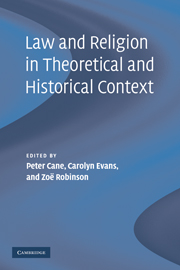Book contents
- Frontmatter
- Contents
- List of Contributors
- 1 Introduction
- 2 The moral economy of religious freedom
- 3 Understanding the religion in freedom of religion
- 4 Why religion belongs in the private sphere, not the public square
- 5 Pluralism in law and religion
- 6 The influence of cultural conflict on the jurisprudence of the religion clauses of the First Amendment
- 7 From Dayton to Dover: the legacy of the Scopes Trial
- 8 A very English affair: establishment and human rights in an organic constitution
- 9 Days of rest in multicultural societies: private, public, separate?
- 10 Australian legal procedures and the protection of secret Aboriginal spiritual beliefs: a fundamental conflict
- 11 Secular and religious conscientious exemptions: between tolerance and equality
- 12 Law's sacred and secular subjects
- 13 Freedom of religion and the European Convention on Human Rights: approaches, trends and tensions
- Index
- References
12 - Law's sacred and secular subjects
Published online by Cambridge University Press: 07 July 2009
- Frontmatter
- Contents
- List of Contributors
- 1 Introduction
- 2 The moral economy of religious freedom
- 3 Understanding the religion in freedom of religion
- 4 Why religion belongs in the private sphere, not the public square
- 5 Pluralism in law and religion
- 6 The influence of cultural conflict on the jurisprudence of the religion clauses of the First Amendment
- 7 From Dayton to Dover: the legacy of the Scopes Trial
- 8 A very English affair: establishment and human rights in an organic constitution
- 9 Days of rest in multicultural societies: private, public, separate?
- 10 Australian legal procedures and the protection of secret Aboriginal spiritual beliefs: a fundamental conflict
- 11 Secular and religious conscientious exemptions: between tolerance and equality
- 12 Law's sacred and secular subjects
- 13 Freedom of religion and the European Convention on Human Rights: approaches, trends and tensions
- Index
- References
Summary
In modern law we exist as a plurality of persons. This is essentially my thesis, starkly put: that we are plural not unitary beings in law and that necessarily our law is, in this sense, pluralistic. Each one of us inhabits our legal world as multiple beings, as multiple subjects, as it could be said we do in life.
The legal world that forms the focus of this paper is that of modern centralised Anglo-American-Australasian state law. Adopting the usage of Peter Cane, I will call this ‘Anglian’ law and thus refer to ‘legal systems the conceptual structure of which is derived from that of English law’. It is within this formal legal arena – its doctrines, its principles, its interpretations – that I wish to examine our plurality of being. We exist, of course, as all sorts of persons outside this formal state-institutionalised law. In the many extra-legal roles we perform (within the family, at work, socially and so on) and in the various cultures we inhabit (be they religious or sexed or sexual or indigenous or whatever), our very persons may be said to transmogrify or multiply. And indeed our extra-legal lives may assume such practical and symbolic importance that our legal personalities may seem to pale in comparison. Some might even say that these other ways by which we order, regulate and make sense of our lives represent rival laws or even rival legal systems.
- Type
- Chapter
- Information
- Law and Religion in Theoretical and Historical Context , pp. 268 - 290Publisher: Cambridge University PressPrint publication year: 2008
References
- 1
- Cited by



